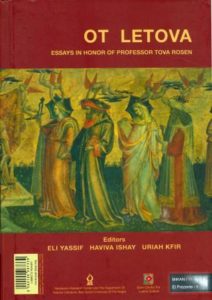Mark R. Cohen ~ Historical Memory And History in The Memoirs Of Iraqi Jews
 Memoirs, History, and Historical Memory
Memoirs, History, and Historical Memory
Following their departure en masse from their homeland in the middle years of the twentieth century, Jews from Iraq produced a small library of memoirs, in English, French, Hebrew, and Arabic. These works reveal much about the place of Arab Jews in that Muslim society, their role in public life, their relations with Muslims, their involvement in Arab culture, the crises that led to their departure from a country in which they had lived for centuries, and, finally, their life in the lands of their dispersion. The memoirs are complemented by some documentary films. The written sources have aroused the interest of historians and scholars of literature, though not much attention has been paid to them as artifacts of historical memory. That is the subject of the present essay.
Jews in the Islamic World before the Twentieth Century
Most would agree, despite vociferous demurrer in certain “neo-lachrymose” circles, that, especially compared to the bleaker history of Jews living in Christian lands, Jews lived fairly securely during the early, or classical, Islamic period, up to around the twelfth or thirteenth centuries. It was not, however, an interfaith utopia, because the Jews (along with Christians) were subject to legal disabilities. But they were also protected as dhimmīs, enjoying freedom of religion and movement and benefiting from untrammeled economic opportunity. These were, furthermore, centuries in which Arabic ideas penetrated deeply into the fabric of Judaism, and in which Jews shared substantially in Arabic-Islamic culture. Persecutions were few and far between and almost always directed at non-Muslims as a category, not at Jews per se. They typically occurred when non-Muslims were perceived to have violated the restrictive ordinances of the Pact of ‘Umar, ignoring the inferior status assigned to them by Islamic religion and law. Anti-Semitism, understood as an irrational belief in a malevolent, violent, anti-social Jewish alliance with satanic forces seeking to control the world, did not exist.
Most would also concur that Jews were more severely oppressed in later Islamic centuries, though the level of oppression is often generalized in the literature to the point of exaggeration. It differed in intensity and in form from place to place and circumstance to circumstance and had much to do with general decline in the Muslim world in the post-classical period, a setback that naturally affected the minorities to a greater extent than the Muslim majority. There was, moreover, a period of substantial remission and revival during the heyday of Ottoman imperial expansion in the Middle East and North Africa in the sixteenth century, which coincided with the influx of highly educated and skilled Sephardic Jews expelled from Catholic Spain in 1492. Furthermore, the modern period saw significant amelioration for at least the more well-to-do Jews in many Islamic countries.
The complete essay: https://library.osu.edu/projects/hebrew-lexicon.pdf
Previously published in: Mark R. Cohen, History and Historical Memory in the Memoirs of Iraqi Jews, in Eli Yassif, et al., eds., Ot LeTova: Essays in Honor of Professor Tova Rosen (Beer Sheva: Dvir, 2012), 110-137 (Hebrew)